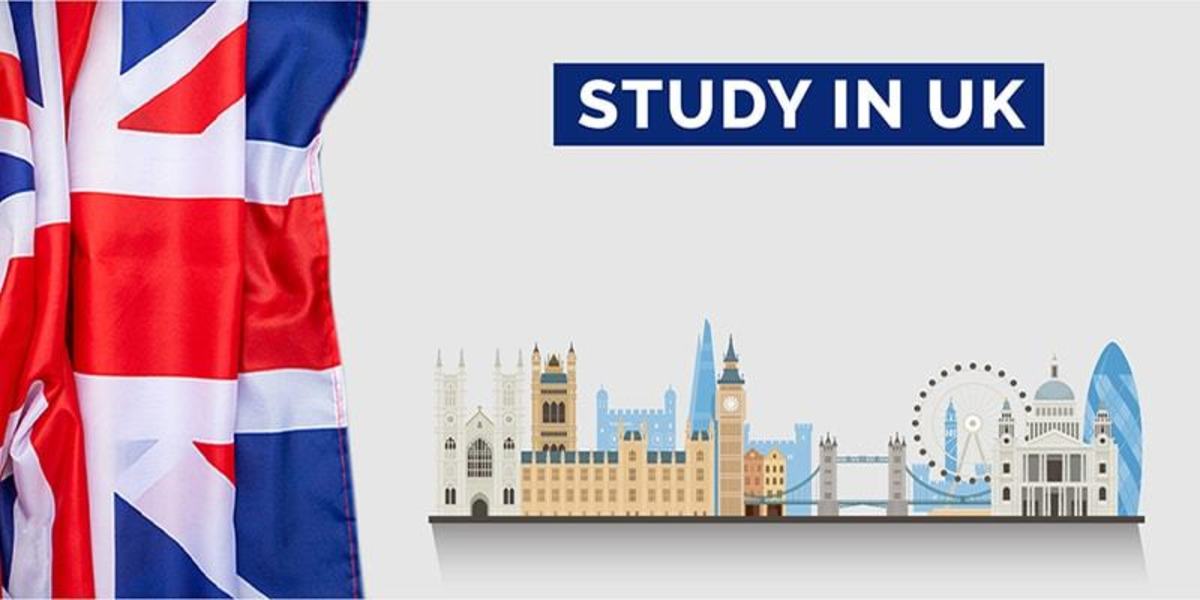
Study in United Kingdom
Why Study in UK?
Study in UK: Key Facts & Statistics
| Languages spoken | English, Welsh, Gaelic, Cornish, and Ulster Scots |
|---|---|
| Top UK cities to study | London, Edinburgh, Manchester, Birmingham, Glasgow, Coventry, and New Castle |
| Intakes | September Intake/Fall Intake, January Intake/Winter Intake, May Intake/Spring Intake |
| Levels of Degrees | Diploma, UG, PG and Doctorate |
| Exams required | IELTS, TOEFL, PTE, Cambridge English Qualifications, OET (Occupational English Test) or ISE |
| Minimum scores required | IELTS – 6.0 to 7.0 TOEFL – 80 to 100 PTE – 50 to 75 CAE – 160 to 180 CPE – 180 to 200 OET – B grade (350 or above) |
| Visa type | Tier 4 (General) Student Visas Child Student Visa Short-term Study Visa |
| Study visa costs | £363 (approx. INR 38,445) |
| Cost of study | Around £17,109 (approx. INR 18,12,285) per year |
| Financial aid | Scholarships, Grants, Student Loans, Work-Study Programs, Funds, and Bursaries for International Students |
Among various English-speaking countries, the UK is a welcoming, safe, and friendly destination for foreign students. It offers a helping environment for learning and personal growth. Indian students choose the UK as their preferred study abroad destination due to their high-quality education and globally recognised degrees offered by its universities.
UK colleges and universities are known for providing excellent academic standards, innovative teaching methodologies, and a strong emphasis on research. The UK presents diverse programs, from Business Management, Engineering, and Computer Science to Arts, Medicine, and Environmental Studies, enabling students to align their choices with their goals.
Tourist Visa
Broad term that can refer to various aspects of interconnectedness and communication on a global scale.Family Visa
Broad term that can refer to various aspects of interconnectedness and communication on a global scale.Student
Broad term that can refer to various aspects of interconnectedness and communication on a global scale.Work Permit
Broad term that can refer to various aspects of interconnectedness and communication on a global scale.Top 10 Benefits of Studying in UK
The UK is famed for its quality education system and ample options for higher studies and employability. With 100+ government-funded and private universities, international students have various study options, including short diplomas, certificates, bachelor’s and master’s degrees, and specialised courses. A unique benefit of studying in the UK is offering diploma degrees and 1-year master’s programs where each course is fast-paced, and in-depth and facilitates faster entry into the UK job market.
- Affordability and SDS: The UK has the Student Direct Stream (SDS) to simplify the visa application process and offers various affordable study options.
- Post-Study Work Opportunities: The new Graduate Route permits international students to work in the UK for up to two years after graduation, enhancing career prospects.
- Language Skill Enhancement: Studying in an English-speaking country like the UK improves language proficiency, providing a competitive edge in the global job market.
- Scholarships for Indian Students: Indian students have access to scholarships such as Chevening and GREAT Scholarships, supporting their education in the UK.
- Research Opportunities: The UKs research-intensive universities enable Indian students to engage in advanced research across various fields.
- Top-Ranked Universities: Access to leading institutions like Oxford, Cambridge, Imperial College London, and UCL deliver quality education. They are ranked among the top 10 QS World University Rankings 2023.
- UK Government Scholarships: Over 80 scholarships and financial aid are available for international students, promoting educational collaboration and cultural exchange.
- Vast Alumni Network: The UKs extensive alumni network offers valuable connections and networking prospects for Indian students throughout their careers.
- Personal Growth and Adaptability: Living in the UK exposes students to diverse cultures, encouraging personal growth, freedom, and adaptability.
- Renowned Education System: The UKs education system is globally recognised for its quality, ensuring a solid foundation for future success.
Popular Courses to Study in UK
Top-tier universities in the UK take a hands-on learning approach in their pedagogical system. It means students learn by doing real-world tasks. Students pick their favourite courses from Business, Engineering, Computer Science, Medicine, Data Science, Artificial Intelligence, Cybersecurity, Social Sciences, and Arts through three main types of degrees: Bachelor’s, Master’s, and Doctoral research programs. The list of popular courses to study in the UK is given below based on global needs:
- Business Management and Entrepreneurship
- Medicine
- Law
- Social Sciences
- Media and communication
- Data Science and Analytics
- Artificial Intelligence and Machine Learning
- Cybersecurity and Information Security
- Nursing and Healthcare Management
- Biomedical Science and Bioinformatics
- Public Health and Epidemiology
- Digital Marketing and Communications
- Engineering and technology
- Finance and Accounting
- Hospitality and Tourism Management
- Architecture and Urban Planning
The list of top courses in the UK for international students with average annual tuition fees are given in the table below.
Top Universities to Study in UK
Best Places to Study in UK
- Oxford-Oxford is located in Southeast England, approximately 60 miles (97 km) northwest of London. Oxford has a nickname of ‘the City of Dreaming Spires’. It is known for its historical charm, picturesque architecture, and the world’s oldest universities. A UK student’s annual course fees are £9,250 for 2023-24.
- London-London the capital city of England and the United Kingdom, is situated in the southeastern part of England. It contains a large number of universities, including well-known institutions like Imperial College London, University College London (UCL), and the London School of Economics and Political Science (LSE). The average tuition fees fell between £9,250 (US $11,470) – £67,892 per year.
- Liverpool- Liverpool is located in the northwest of England, along the eastern side of the Mersey Estuary. The city is famous for its maritime history, cultural heritage, and the iconic Liverpool Cathedral. The average Tuition Fee ranges between GBP 21,000 – GBP 40,000 per year.
- Bath-Bath is situated in the southwest of England, renowned for its natural hot springs, Georgian architecture, and Bath Abbey. It hosts the University of Bath, known for engineering, architecture, and social sciences. The average tuition fee ranges between 3,120 to 37,500 GBP (3.25 to 39.12 lakhs) per annum.
- Birmingham- Birmingham is located in the West Midlands region of England. It is a vibrant and diverse city with a rich industrial history and a thriving cultural scene. The average Tuition fee is between INR 9.8 Lakhs – 19.2 Lakhs annually.
- Edinburgh- Edinburgh is the capital city of Scotland, located in the southeastern part of the country. The city has great historic and cultural landmarks including the Edinburgh Castle and the Royal Mile. The tuition fee in Edinburgh is around GBP 29,000 35 lakhs/year.
- Glasgow- Glasgow is the largest city in Scotland and is situated in the western part of the country. It has multiple universities, including the University of Glasgow and the University of Strathclyde. The city is celebrated for its cultural offerings, art galleries, and music scene. The average tuition fee is between GBP 6,800 to GBP 53,460 per year.
- New upon Tyne- Newcastle upon Tyne is located in the northeastern part of England. The city commonly known as Newcastle, with an energetic nightlife, rich history, and proximity to stunning landscapes. The average tuition fee lies between GBP 19200 – GBP 24300 per year.
- Wales- Wales is a country that is part of the United Kingdom, located to the west of England. The city is popular for its cultural festivals and Cardiff Castle. Cardiff University offers a wide range of academic programs. The average tuition fee ranges from £12,000 to £22,000 per year
- Manchester – Manchester is a major city in the northwest of England. The city has a rich industrial heritage, a great music scene, and the University of Manchester, one of the UK’s largest and top institutions. The average tuition fee is typically around 12,200 GBP to 44,800 GBP per annum.
- Coventry – Coventry is situated in the West Midlands region of England. Coventry University and the University of Warwick are prominent universities in the city. It is notable for its history and the modern Coventry University, known for its innovative programs. The average tuition fee is generally around 20,050 GBP to 24,050 GBP (19 to 23 lakhs INR) per year.
How to Study in UK?
UK Student Visa Requirements
Student Visa Requirements for UK


Intakes to Study in UK
September Intake
January Intake
May Intake
| Semester Intakes | Application Deadline | Intake duration |
|---|---|---|
| September/Fall Intake | January – June | September to December |
| January/ Winter Intake | September – November | January to April |
| May/Spring Intake | Late April – End of April | April to June |
Education Loan for Studying in UK

Here are the expenses that are commonly covered under education loans for studying in the UK:
- Tuition Fees
- Accommodation Costs (including rent and utilities)
- Travel Expenses (flights, cab or taxi, other transportation)
- Study Materials (books, supplies, equipment)
- Living Expenses (food, personal expenses)
- Health Insurance
- Visa Fees and Application Costs
- Exam Fees (IELTS, TOEFL, etc.)
- Research Expenses
- Other Academic Costs (workshops, seminars)
- Placement and Internship Expenses
- Miscellaneous Costs
Documents Required for Studying in UK for Indian Students
To secure admission in UK colleges and universities, Indian students are typically required to submit the following documents:
Valid passport
Official academic records
Evidence of financial funds
Completed visa application form
Passport-size photographs
Academic Technology Approval Scheme
Frequently Asked Questions
How much will it cost to study in the UK?
Does the UK require IELTS for study?
Is it cheaper to study in the UK?
How can I study in the UK from India?
- Research and explore universities and programs that match your interests and qualifications.
- Apply and complete the university application process, which may include submitting academic transcripts, a personal statement, Test Scores for SAT/ GMAT/ GRE (as per the course), English proficiency test scores of IELTS/ TOEFL/ PTE/ Other (as per the course) and references.
- For visa application, apply for a Tier 4 (General) student visa from the UK Visa Application Centre in India.
- Provide evidence of sufficient funds to cover tuition fees and living expenses.
- Get complete health insurance coverage.
- Plan your travel and accommodation arrangements.



